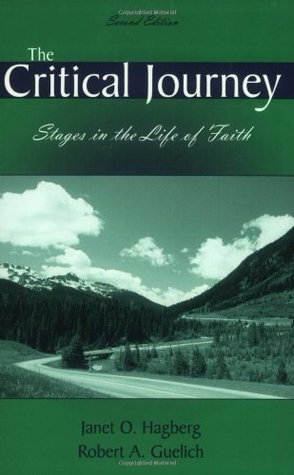
The Critical Journey: Stages in the Life of Faith portrays the life of faith in dynamic rather than static terms. It recognizes that what faith means can change over time. Janet O. Hagberg and Robert A. Guelich outline a six stage journey of faith:
- Recognition of God
- The Life of Discipleship
- The Productive Life
- The Journey Inward
- The Journey Outward
- The Life of Love.
The authors emphasize that these stages don’t reflect a greater closeness to God as one progresses but rather a different experience of the God with whom we all enjoy the same access. Nor are these stages that we progress through once and for all but rather that we may cycle through these again and again.
Most significant in this book is the author’s discussion of “The Wall” during Stage 4. During “The Wall” our will meets God’s will and the challenge is whether we will flee from the discomfort of this stage or lean into this process and allow God to lead us into surrender and awareness of our acceptance and God’s unconditional love. One of the things I also appreciated in The Critical Journey related to this concept is the discussion of stage 4 when questioning and doubt resurfaces. In my work with graduate students, I discover that this stage can coincide with grad school where the formational and intellectual engagement of grad school challenge the prior understanding of faith and practice formed in prior years. It is also interesting to me that the authors observe that most churches and ministries do well with stages 1 to 3.
So one of the real questions for me is, “What does it mean for our ministry to be a stage 4 to 6 ministry–one that doesn’t sacrifice the discipleship and mission emphases of earlier stages, but addresses the less conventional but vital work of stage 4, the Wall and beyond?” As you have thoughts and/or models to share, please do such in the comments section.
Editor’s note: A few related pieces by Bob Trube which are of interest with regard to this topic:
- Critical Junctures in the Spiritual Formation of Graduate Students and Young Faculty — Emerging Scholars Network
- Intellectual Hospitality or Hostility? — Bob on Books
- Living Attentively in the Academy — The Well
- Seven Habits of the Highly Effective Christian Graduate Student — Emerging Scholars Network
Bob Trube is Associate Director of Faculty Ministry and Director of the Emerging Scholars Network. He blogs on books regularly at bobonbooks.com. He resides in Columbus, Ohio, with Marilyn and enjoys reading, gardening, choral singing, and plein air painting.

I’ve been reflecting on the way so many faith communities are “hitting the wall” and entering a liminal space. But are there books that address this transition in terms of these dynamics for entire faith communities — with all the challenges and possibilities? So far, I don’t think so…
I too, have been reflecting on ministers being in stage 4 or beyond and, there in, the implications to ministry. It seems to me, that stages 1-3 maybe where most parishioners or seekers may be. As indicated on page 187, “confirmation faith” is what is most powerful to the majority of people.What does this tell church leadership abut the declining church? Those churches that continue to see growth in membership, seem to be doing an excellent job at delivering a “confirmation faith.” Does this mean we, as leaders, may need to focus specifically on stages 1-3 for our parishoners? How does the wall parallel with clergy burnout? It seems to me to be a direct correlation. Perhaps the larger question is how can the church be the church for persons at all stages of faith and work more as a community of faith?
A longtime friend offered to read “A Grief Observed” by C.S. Lewis with me during a season that, in hindsight, is akin to Critical Journey’s “Stage 4” and “The Wall.” It provided deep comfort and companionship (via both C.S. Lewis’s parallel journey and the companionship of my friend). I imagine offering a similar type of small group / support in faith communities is a way that we can consider ministering to those in “Stage 4 and Beyond.”
Tammy, thank you for sharing your “Stage 4” and “Wall” experience. It strikes me that the personal companionship you experienced is much more fitting at this stage than the more programmatic offerings we find in stages 1-3. I have known of well facilitated support groups that offer help but suspect that for many, help may come through the companionship you experienced. I’m glad God met you in this way!
I cite the Critical Journey and other sources in this treatment of leaders and communities in a transitional place — off the map — http://nextreformation.com/?p=13153
Ministry to those in Stage 4 is focused on healing. It is highly personal and tied to the hurts, habits, and hangups one has collected in life. These are difficult to address in a program, but recovery ministries like Celebrate Recovery are surprisingly fitting. Individual counseling and other “healing” ministries or personal retreats are also useful. As noted in the book, a personal crisis is often the catalyst for moving forward.
For those who exit the wall, God usually provides sufficient direction on next steps Ministry to those in Stage 5 and 6 is more about accountability to sustain personal disciplines and to help people who regress to earlier home stages. For the most part, just stay out of their way and let them minister to others!